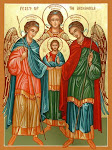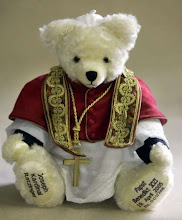It was given by a senior theology/philosophy major and centered on the message of Luke's Gospel, particularly Luke 15.
It was only a few weeks ago that I gave a lecture to my 5th graders about the three parables in Luke 15, so I was really interested in what a senior at my college had to say. I took lots of notes.
Seriously.
I basically re-outlined his presentation for him.
After introducing us to the author, a Gentile Christian preaching mostly to the wealthy, the student introduced his thesis on Luke's Gospel. To paraphrase, God is the Seeker and Savior of the lost and marginalized.
Ah, can you tell I go to a Jesuit school?
But I loved it, of course.
This presentation led to me to a key structure present in each parable which led to a higher theological truth when looking at the big picture. Consider the first parable, the parable of the Lost Sheep. The structure follows as such:
1. Jesus insulting the Scribes and Pharisees. (compares them to lowly shepherds)
2. Jesus saving one sheep out of ninety-nine.
3. Point: God seeks the one others find insignificant.
The same structure is present in the parable of the Lost Coin, only this time the one that is lost becomes intensified.
1. Jesus insulting the Scribes and Pharisees. (compares God to a woman)
2. God saving the one lost coin out of ten.
3. Point: God seeks the one others find insignificant and that one is the most important to God.
Finally, this all comes together in the well-known parable of the Prodigal Son.
1. Jesus insulting the Scribes and Pharisees. (A Jewish son disrespects his father like that??)
2. God forgiving BOTH sons that were lost.
3. Point: Our relationship with God is not that of Master and Servant, but that of Father and Child.
From all these parables, the speaker concluded, God is telling us that he does have preferential treatment for the lost and the lowly - namely the sinners, tax collectors, lepers, and the poor. He specifically states that God is overjoyed when one sinner comes back to Him, such as he is not when ninety-nine righteous men do. This is not to say that God does not love the rich and the powerful, but that God reserves special treatment for those without earthly wealth and power.
I thought it was a wonderful presentation - and it wasn't too far away from what I had taught my 5th graders!












No comments:
Post a Comment